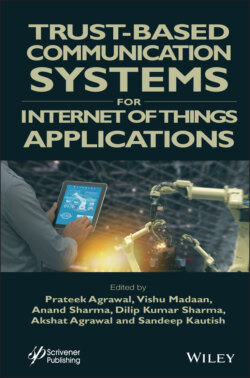Читать книгу Trust-Based Communication Systems for Internet of Things Applications - Группа авторов - Страница 4
На сайте Литреса книга снята с продажи.
List of Illustrations
Оглавление1 Chapter 1Figure 1.1 IoT.Figure 1.2 Growth of Internet of Things.Figure 1.3 IoT applications.Figure 1.4 Smart home.Figure 1.5 Smart city.Figure 1.6 Smart grid.Figure 1.7 Wearables.Figure 1.8 Connected car.Figure 1.9 Digital health.Figure 1.10 Smart farming.Figure 1.11 IoT application areas in 2020.Figure 1.12 Security challenges of IoT.
2 Chapter 2Figure 2.1 Simplified blockchain.Figure 2.2 Blockchain.Figure 2.3 Ecosystem of blockchain [18].Figure 2.4 Blockchain privacy [1].Figure 2.5 Limitations of blockchain.
3 Chapter 3Figure 3.1 IoT sensors over business objectives.Figure 3.2 Encryption and decryption process.Figure 3.3 Symmetric encryption.Figure 3.4 Asymmetric encryption.
4 Chapter 4Figure 4.1 Essential elements of IoT systems.Figure 4.2 Internet of Medical Things (IoMT) architecture.Figure 4.3 Wearable devices used in healthcare.Figure 4.4 IoT architecture (three layer, five layer).Figure 4.5 Fog based IoT architecture [6].Figure 4.6 Requirement of security at different layers of IoT architecture.Figure 4.7 Different types of security attacks in IoT system.Figure 4.8 Various security challenges of the IoT system.
5 Chapter 5Figure 5.1 Cyber physical system.Figure 5.2 Communication channel.Figure 5.3 IOT vs CPS representation.Figure 5.4 Cyber physical system in agriculture.Figure 5.5 Cyber physical system in education.Figure 5.6 Cyber physical system in energy management.Figure 5.7 Cyber physical system in environmental monitoring.Figure 5.8 Cyber physical system in accessible systems.Figure 5.9 Cyber physical system in healthcare.Figure 5.10 Cyber physical system in manufacturing.Figure 5.11 Cyber physical system in physical security.Figure 5.12 Cyber physical system in smart buildings.Figure 5.13 Cyber physical system in transportation
6 Chapter 6Figure 6.1 Way of trust calculation.Figure 6.2 Nodes connection in networks.Figure 6.3 Observation record.Figure 6.4 Indirect trust.Figure 6.5 Trust between nodes.
7 Chapter 7Figure 7.1 Three-level architecture of fog computing.Figure 7.2 IoT data indexing and discovery.Figure 7.3 Evaluation of index structures of different indexing structures on di...Figure 7.4 Total count of distances computed for building of binary tree.Figure 7.5 Total count of comparisons based on containers.Figure 7.6 Time required for building of binary tree on basis of containers.Figure 7.7 Comparison of different indexing structures based on count of compute...Figure 7.8 Comparison of different indexing structures based on count of compute...Figure 7.9 Presents count of comparison made by different indexing structures.Figure 7.10 Performance evaluation based on execution time of search processes.Figure 7.11 Observation on data partitioning rate obtained from different datase...
8 Chapter 8Figure 8.1 Vertical and horizontal aspects of internet of things.Figure 8.2 Relationship between IoT, IIoT, and Industry 4.0.Figure 8.3 Evolution of IIoT.Figure 8.4 Three-layer architecture of IIoT.Figure 8.5 Reference architecture platform for industry 4.0 [26, 27].Figure 8.6 IIoT basic technologies.Figure 8.7 Fourth industrial revolution.Figure 8.8 Design principles of industry 4.0 [34].
9 Chapter 9Figure 9.1 IoT applications in cities [7].Figure 9.2 Smart water supply [9].Figure 9.3 Smart infrastructure [14].Figure 9.4 Smart Dubai Agenda [16].Figure 9.5 Smart home connectivity [29].Figure 9.6 IoT in smart building applications [30].
10 Chapter 10Figure 10.1 Block diagram of Arduino.Figure 10.2 SEQ Figure \* ARABIC 1: Arduino Uno.Figure 10.3 Programming the arduino using arduino IDE.Figure 10.4 Adding the server in the app using IP address and port number in TCP...Figure 10.5 Schematic diagram.Figure 10.6 Face recognition using MATLAB.Figure 10.7 Motor (Acting as Door) connected with arduino.Figure 10.8 Flow chart.
11 Chapter 11Figure 11.1 Sources of global CO2 emission.Figure 11.2 Country-wise contribution in world’s CO2 emissions.Figure 11.3 Classification of micro mobility.Figure 11.4 Growth trend of e-scooter worldwide.Figure 11.5 Ways e-scooters help the environment [19].Figure 11.6 CO2 impact by e-scooter.Figure 11.7 Standard operating process to monitor the movement of e-scooter. PRO...Figure 11.8 Fleet management with integrated IoT technology to monitor the movem...Figure 11.9 Process flow for real-time information technology integration.Figure 11.10 Geofenced area highlighted in red.Figure 11.11 Arnab scooters parked neatly at the designated stations.Figure 11.12 Arnab being ridden safely by the rider.
12 Chapter 12Figure 12.1 Main elements of oneM2M IoT architecture [11, 12].Figure 12.2 Details of IoT reference model published by IoTWF.Figure 12.3 IoT reference model connectivity layer functions.Figure 12.4 IoT reference model layer 3 functions [15].Figure 12.5 Simplified IoT architecture.Figure 12.6 Expanded view of simplified IoT architecture.Figure 12.7 IoT based automatic LPG gas booking and leakage detection system.Figure 12.8 NodeMcu board.Figure 12.9 Load cell.Figure 12.10 HX711.Figure 12.11 MQ2 gas sensor.Figure 12.12 Sequential diagram for hardware.Figure 12.13 Sequential diagram for software.
